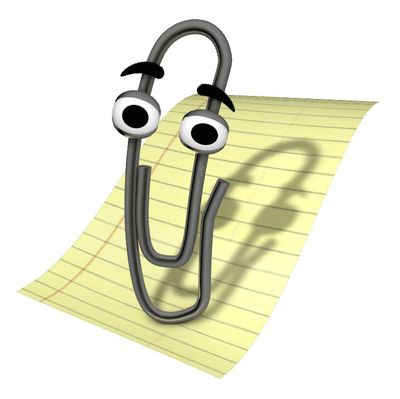
Microsoft sent Clippy, its big-eyed, weirdly smirky anthropomorphic paper clip, to that great office drawer in the sky in 2007, but it doesn’t seem that people spent much time mourning him. Perhaps that’s because while Clippy, Microsoft Office’s digital assistant, was ostensibly lurking at the corner of the screen to offer helpful assistance, in reality he was king of the unwanted question: “It looks like you’re writing a letter. Do you need some help with that?” No, Clippy, I do not need some help with that. The answer is always no.
He’s received plenty of hate over the years, and not just for his dogged, condescending persistence. He’s also, well, a little creepy — as Robinson Meyer has reported for The Atlantic, women in early focus groups thought Clippy was leering at them (a critique that was soundly ignored by Microsoft engineers). And a new study in the Journal of Consumer Research, recently highlighted by Vocativ, has identified one more reason why that little paper clip sent so many people into rage spirals: Digital assistants tend to make us feel powerless. It’s not just Clippy, in other words — it’s his entire species.
For the study, researchers from the University of Hong Kong and Hong Kong Baptist University asked a group of college students to run through a series of puzzle games on a computer. If they needed help at any point, they were faced with one of two options: Some students could access a regular old help menu, represented by a computer icon, while the rest got the same information by clicking on a smiley face.
Members of this second group, the authors found, enjoyed the game less, and were less motivated to keep playing, than those who got their help from a faceless image (even though, once again, it was the exact same information). People exposed to the smiley face also reported feeling less in control of the game, which the researchers offered up as the reason for their displeasure. “The presence of an anthropomorphized helper can undermine individuals’ perceived autonomy,” they wrote (and this particular helper wasn’t even chiming in with help offers unbidden, à la Clippy). Is that little icon smiling because he’s happy to help, or because he’s so thrilled to be bossing you around? Often, the study suggests, people using digital assistants perceive it as the latter.
Freedom won, then, the day that Clippy died. “I think that social user interface wasn’t ready for the mainstream yet,” Microsoft Office program manager Jensen Harris told PC magazine following the icon’s demise, “although you have to appreciate the risk that was taken.” Welllllll … do you have to, really? The mainstream may never be ready for this particular social user interface. People value autonomy at work above all else, but it’s a hard thing to achieve when a smiley face (or a pixelated paper clip) won’t stop telling you what to do.




